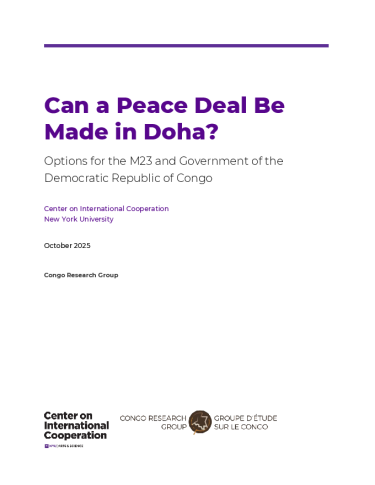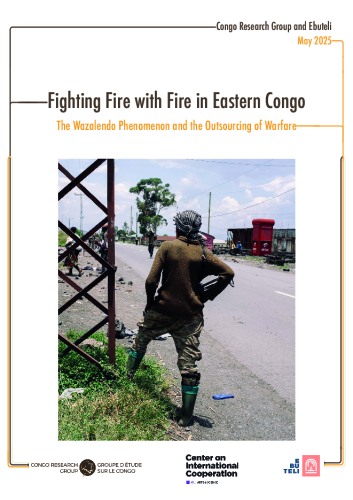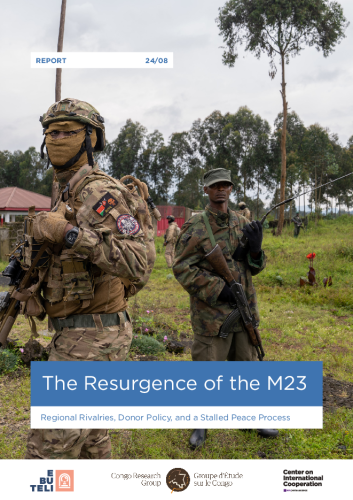In 2025, the government of the Democratic Republic of the Congo (DRC) was engaged in formal negotiations with the Rwanda-backed March 23 Movement (M23) rebel group that had progressively seized control of large parts of the Congolese provinces of North and South Kivu since late 2021. These negotiations are being hosted by the State of Qatar in Doha and are commonly referred to as the Doha process.
The M23 is the most recent in a series of Rwanda-backed rebellions in the eastern DRC. While the Kinshasa government has tried for several years to achieve a military solution to the conflict, it has gradually lost ground to the M23. The Congolese army—along with private security contractors it has hired and local Wazalendo[i] militias it has backed—and troops from the East African Community (EAC), the Southern African Development Community (SADC), and the United Nations (UN), were unsuccessful in stopping the rebels’ advance. In early 2025, the M23/Alliance Fleuve Congo (AFC, the M23’s political umbrella), with backing from the Rwandan army, seized first Goma, then Bukavu—the eastern Congo’s two biggest cities. This is the most significant challenge to Congolese sovereignty and stability since the end of the Great Congo Wars in 2003.
It is important for the peace process in the DRC to consider lessons learned from both other countries and the country’s own past. We examine the three previous attempts to deal with Rwandan-backed rebellions: the RCD in 2002, the National Congress for the Defense of the People (CNDP) in 2009, and the first M23 one in 2013. The parties at the negotiation table themselves are already shaped by these past peace processes and negotiations.
This paper focuses on the immediate options for an agreement between the M23 and the Congolese government. We outline the five most likely outcomes of the Doha mediation process between the DRC government and the AFC/M23. We do not endorse any of the five possible outcomes—instead, we present the advantages and disadvantages of each. These options range from the scenario most favorable to the DRC to the one most favorable to the M23.
Out of necessity, this agreement will likely be unable to address many of the long-term drivers of conflict, including the need for strong, accountable institutions (especially in the security sector), social and economic exclusion, communal reconciliation, and land tenure reforms. Those goals will need to be integrated into a wider peace process that can address the many other armed groups in the DRC.
Success in Doha will also depend on the implementation of a separate peace agreement between Rwanda and the DRC, which was signed on June 27, 2025 in Washington, DC under the auspices of the United States.[iv] While the specifics of this parallel peace agreement are not discussed here, we argue that ending the M23 rebellion will rely on external pressure on Kigali and Kinshasa. Conversely, the success of the Washington agreement increasingly appears to rely on progress made in Doha. Finally, Washington and Doha will also need to involve other actors—other foreign donors, but in particular African organizations and actors—if either process is to succeed.
###
[i] Congo Research Group and Ebuteli, “Fighting Fire with Fire in Eastern Congo: The Wazalendo Phenomenon and the Outsourcing of Warfare,” NYU Center on International Cooperation, May 15, 2025, https://cic.nyu.edu/resources/the-wazalendo-phenomenon-and-the-outsourcing-of-warfare/.
[ii] “DRC and M23 rebels sign ceasefire deal,” Le Monde with AFP, July 19, 2025, https://www.lemonde.fr/en/international/article/2025/07/19/drc-and-m23-rebels-sign-ceasefire-deal_6743525_4.html.
[iii] U.S. Senior Advisor for Africa (@US_SrAdvisorAF), “We commend the signing of the Prisoner Exchange Mechanism by the Government of the Democratic Republic of the Congo and the AFC/M23, a pivotal step toward de-escalating hostilities and fostering peace in eastern DRC. Under this mechanism, the International Committee of the Red Cross (ICRC) will act as a neutral intermediary to facilitate the identification, verification, and safe release of detainees held by both sides. We deeply appreciate Qatar’s critical work with the @ICRC on this process and encourage parties to use this momentum to make additional progress on reaching a final peace agreement,” X (formerly known as Twitter), September 12, 2025, 10:14 a.m., https://x.com/US_SrAdvisorAF/status/1966505628160954775.
[iv] Press Release, “Peace Agreement Between the Democratic Republic of the Congo and the Republic of Rwanda,” US Department of State Bureau of African Affairs, June 27, 2025, https://www.state.gov/peace-agreement-between-the-democratic-republic-of-the-congo-and-the-republic-of-rwanda.


